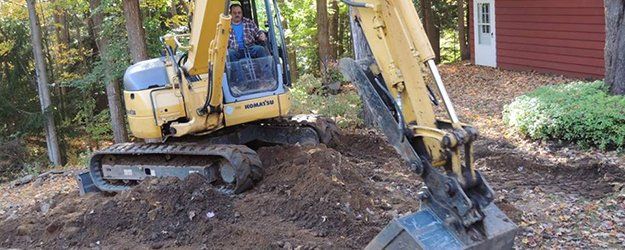Septic Ohio - Comprehensive Septic System Providers in Ohio
Septic Ohio - Comprehensive Septic System Providers in Ohio
Blog Article
Comprehensive Excavation Methods: Understanding the Principles for Success
The cautious preparation, accurate execution, and thorough attention to information needed in excavation projects demand a comprehensive approach that includes different essential elements. The real proficiency exists not simply in understanding these fundamentals however in flawlessly incorporating them to browse the complexities of excavation jobs with skill.
Recognizing Excavation Job Preparation

Successful excavation tasks are improved the structure of thorough and extensive planning. The initial stage of any type of excavation task is the drawing board, where essential decisions are made that can substantially influence the end result of the job. During this phase, it is vital to collect all pertinent info about the website, including topographical studies, soil make-up, and any possible threats that might exist. Recognizing the task budget plan, range, and timeline restrictions is essential for developing a thorough excavation strategy that ensures the project's success.
One key element of excavation job preparation is the advancement of a detailed timeline that lays out the sequence of turning points, activities, and deadlines. This timeline acts as a roadmap for the job team, allowing them to track progress and make required changes to make sure the job remains on routine. Furthermore, a distinct budget that represents all expenses, including devices service, labor expenses, and materials, is important for preventing expense overruns and hold-ups. By very carefully taking into consideration all these aspects during the preparation stage, excavation projects can be executed effectively and effectively, causing effective results.
Soil Analysis and Site Examination
Carrying out comprehensive dirt analysis and site analysis is an important action in the prep work stage of any type of excavation project. Soil evaluation entails figuring out the structure, framework, and properties of the soil at the excavation site. This information is vital for comprehending the dirt's bearing ability, dampness web content, and possibility for erosion, which are key aspects in establishing the excavation techniques and tools needed for the job.
Website analysis goes past soil analysis and includes a more comprehensive evaluation of the total website problems. This evaluation consists of determining any type of possible hazards, such as underground utilities, ecological concerns, or unstable surface, that might influence the excavation process. By completely evaluating the site, job managers can establish effective excavation approaches that focus on safety and security, efficiency, and environmental management.
Utilizing advanced modern technologies like ground-penetrating radar, dirt sampling, and drone studies can enhance the precision and efficiency of dirt evaluation and website assessment. Investing time and resources in these initial actions can ultimately save time and prevent costly hold-ups or difficulties during the excavation procedure.
Devices Selection and Application
Effective excavation jobs depend heavily on critical tools selection and use to make sure optimum performance and performance. Picking the appropriate equipment for the task is vital in taking full advantage of efficiency and minimizing downtime. Factors such as the sort of dirt, deepness of excavation, and job scope play a considerable function in establishing one of the most suitable tools for the task handy.

In addition to picking the appropriate equipment, appropriate use is key to project success. Operators needs to be educated to handle the equipment securely and effectively - dump truck companies in ohio. Normal maintenance checks and prompt repair work assist avoid breakdowns and make sure constant performance throughout the job
Security Procedures and Rules Conformity
In the realm of excavation jobs, try here prioritizing precaution and compliance with guidelines is vital to guaranteeing a lawfully audio and secure operational setting. Precaution include a range of techniques, consisting of carrying out detailed website analyses, applying appropriate signage and barriers, and official website giving sufficient security training for all employees associated with the excavation procedure. Adherence to regulations, such as OSHA needs in the USA, makes sure that the excavation project fulfills the needed standards to protect employees, onlookers, and the surrounding setting.

Surveillance Development and Adjusting Methods
Exactly how can forecast managers effectively track the advancement of excavation tasks and adjust their techniques accordingly to optimize outcomes? Tracking progress is necessary for guaranteeing that excavation projects stay on track and meet deadlines. Job managers can utilize various devices and strategies to track progress, such as day-to-day report card, regular website assessments, and advanced surveillance technologies like drones and GPS tracking systems. By constantly keeping an eye on the project's advancement, managers can determine any type of possible delays or issues early on and take proactive procedures to address them.

Final Thought
Finally, understanding the principles of detailed excavation techniques is vital for the success of any official website kind of job. By understanding task preparation, assessing soil and website conditions, picking suitable tools, following safety and security laws, and keeping track of progression, project supervisors can make certain a effective and smooth excavation procedure. Carrying out these methods will bring about effective outcomes and reduce possible dangers or obstacles throughout the excavation project.
The preliminary stage of any excavation job is the planning phase, where crucial choices are made that can dramatically affect the end result of the job. Recognizing the job timeline, budget plan, and range restraints is critical for creating a thorough excavation strategy that ensures the task's success.
How can forecast supervisors properly track the innovation of excavation tasks and adjust their approaches as necessary to enhance outcomes? By carefully keeping an eye on progression and being eager to adjust strategies, task supervisors can improve the total success of excavation jobs.
By recognizing job preparation, assessing dirt and website problems, picking appropriate equipment, conforming with safety and security policies, and monitoring progress, project managers can make certain a effective and smooth excavation process.
Report this page